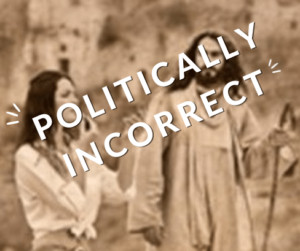 We live in a politically-driven, divided culture faced with conflict on every side, and it is becoming increasingly fractured. Allegations of racism, the sanctity of life vs. abortion rights, Judeo-Christian ethics vs. “woke” ideology, the list goes on and on. You get the picture. We cannot help but be concerned about the impact these issues have on us now and how they will impact our future. How are we to react to our world? Are we to be passive and let things happen? Are we to become political activists?
We live in a politically-driven, divided culture faced with conflict on every side, and it is becoming increasingly fractured. Allegations of racism, the sanctity of life vs. abortion rights, Judeo-Christian ethics vs. “woke” ideology, the list goes on and on. You get the picture. We cannot help but be concerned about the impact these issues have on us now and how they will impact our future. How are we to react to our world? Are we to be passive and let things happen? Are we to become political activists?
Conflicts like these are not new. They have been ongoing throughout human history. Jesus was politically incorrect. He kept the Jewish Law but broke social and religious taboos imposed by the culture.
“The Samaritan woman said to him, “You are a Jew and I am a Samaritan woman. How can you ask me for a drink?” (For Jews do not associate with Samaritans.). (John 4:9 NIV)
The Samaritan woman’s question reveals two issues that are relevant today: 1) racism and 2) gender inequality.
The Jews hated the Samaritans. Historically, the Assyrians conquered the 10 tribes of Israel and took them into captivity. The king of Assyria sent Assyrians to inhabit Samaria, who intermarried with the remaining Israelite population. This resulted in the Israelites viewing the Samaritans with disdain. In addition, women in that culture did not have any rights, and men did not publicly interact with them socially. Hence, it was a double taboo for Jesus to speak to a Samaritan woman. Further in the chapter, it says,
“Just then, his disciples returned and were surprised to find him talking with a woman. But no one asked, ‘What do you want?’ or ‘Why are you talking with her?’ (John 4:27 NIV)
Without any lecture or sermon, Jesus showed his disciples how to rise above social/political barriers to advance His Kingdom, a kingdom that was not restricted by race or gender but open to all people. The following are three truths that we can apply to rise above our politically and ideologically divided culture:
- Social, political, racial, or ideological differences do not need to drive a wedge between us and those who oppose us. Conversely, love and respect can act as the hammer and chisel to dismantle the bricks of the dividing wall and become the mortar to build a bridge connecting us at a human level. Jesus fleshed out what He taught in Luke 6:27-28,
“But to you who are listening I say: Love your enemies, do good to those who hate you, bless those who curse you, pray for those who mistreat you” (NIV).
He disregarded the fact that she was a Samaritan and a woman. He broke through barriers because He saw her as someone who was created in God’s image with a need that needed to be filled (this will be addressed in the next post).
- If we earn the right to be heard through love and respect, the truth of God’s Word is the foundation of our message, no matter the subject. Our personal opinions are secondary to the Truth. Standing on God’s Word minimizes the possibility of a discussion escalating into an argument.
- In a political climate that promotes “woke” ideology, it is necessary to be politically incorrect. It is troubling that some churches are compromising biblical authority to be acceptable in the current political climate. Jesus did not compromise because what He offered to Samaritan woman met her deepest need. If we truly believe in the life-changing power of gospel, we will not succumb to political correctness. Politics cannot change hearts, anyway. Only God can!
Much more can be said about how followers of Christ can be vocal or active in the political arena, but that discussion is for another day. The takeaway here is to follow Jesus’ example and not reject but earn the respect of those who may be on the opposite end of the social/political scale.
The testimony of our lives must be consistent with the testimony of our words.
Stop and Consider . . .
Next: Part 4, What Boxes do You Check?

Leave A Comment